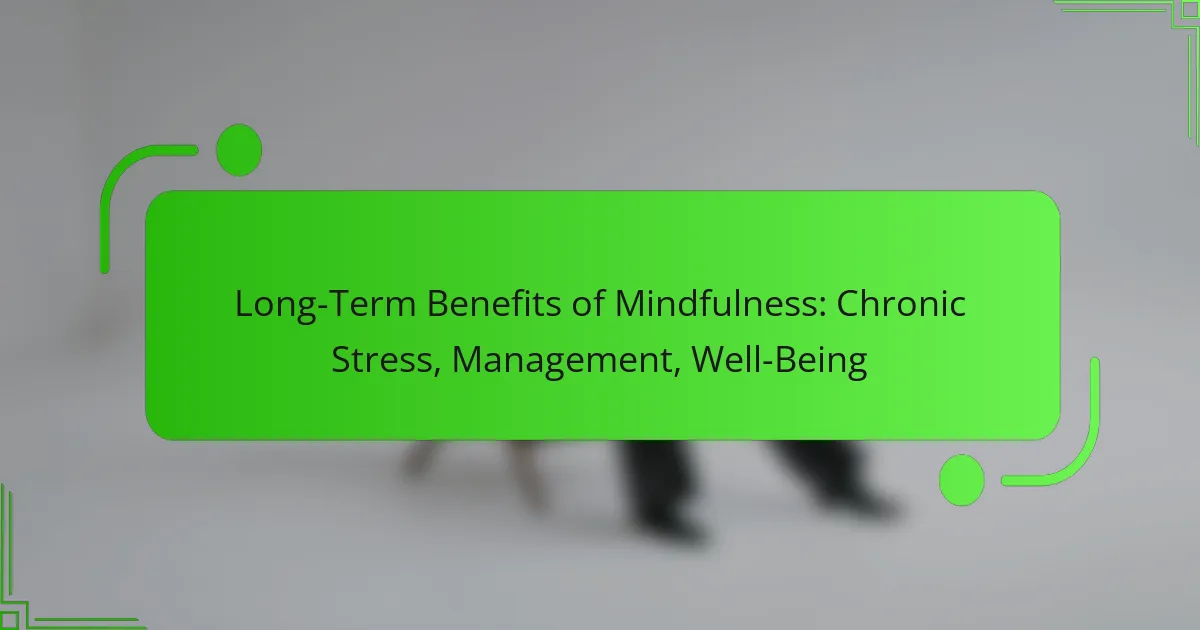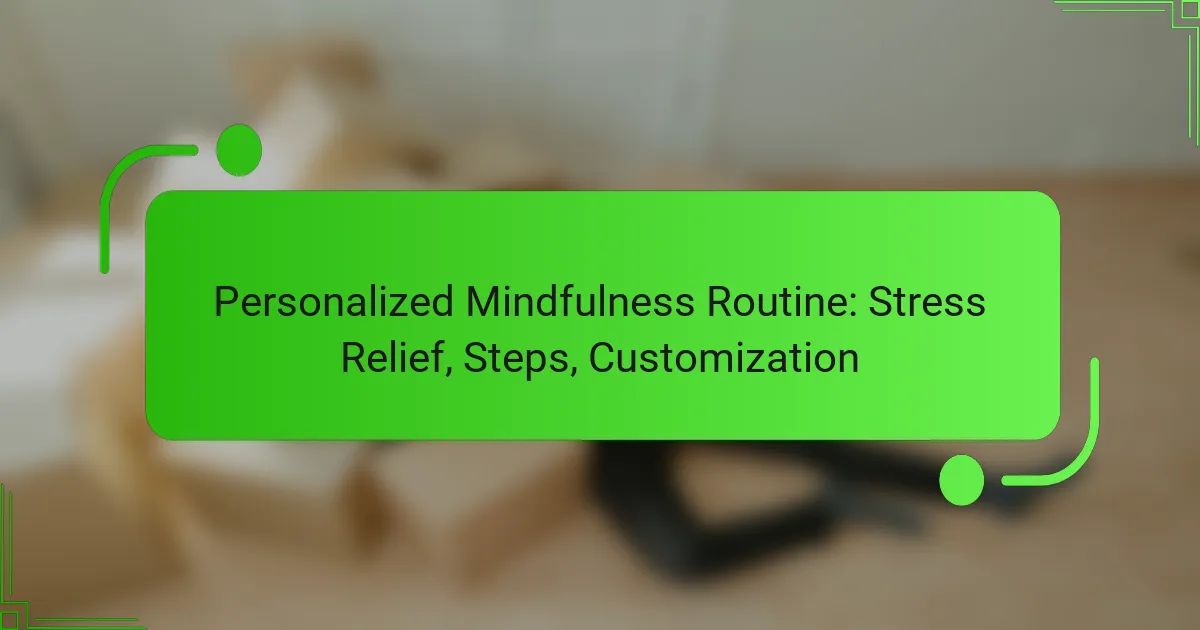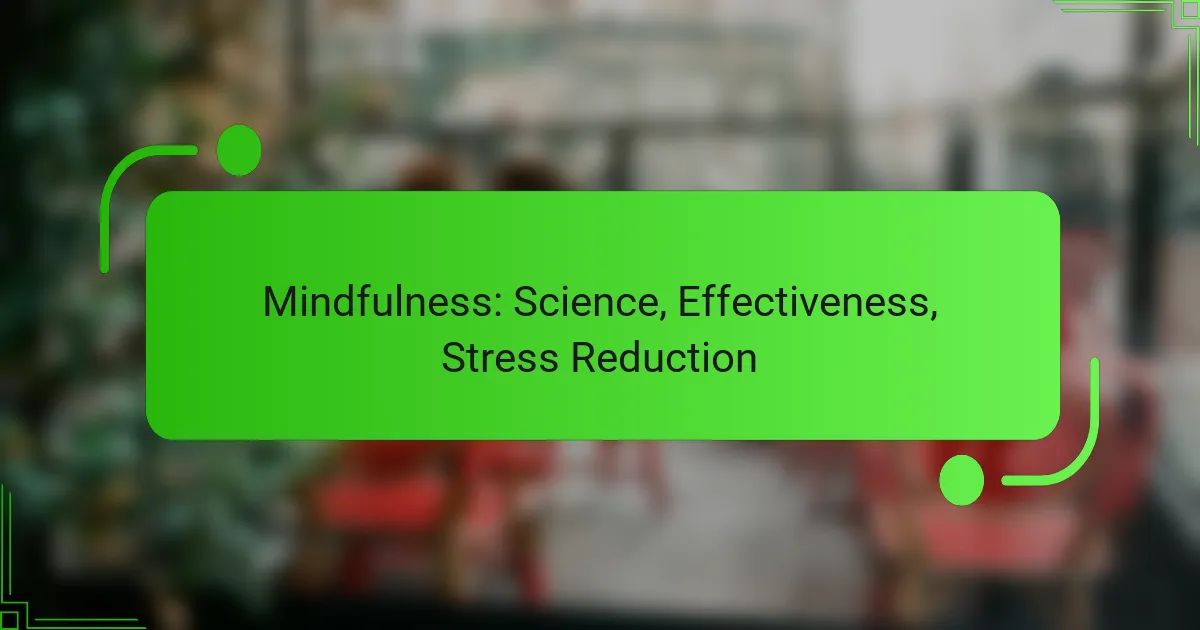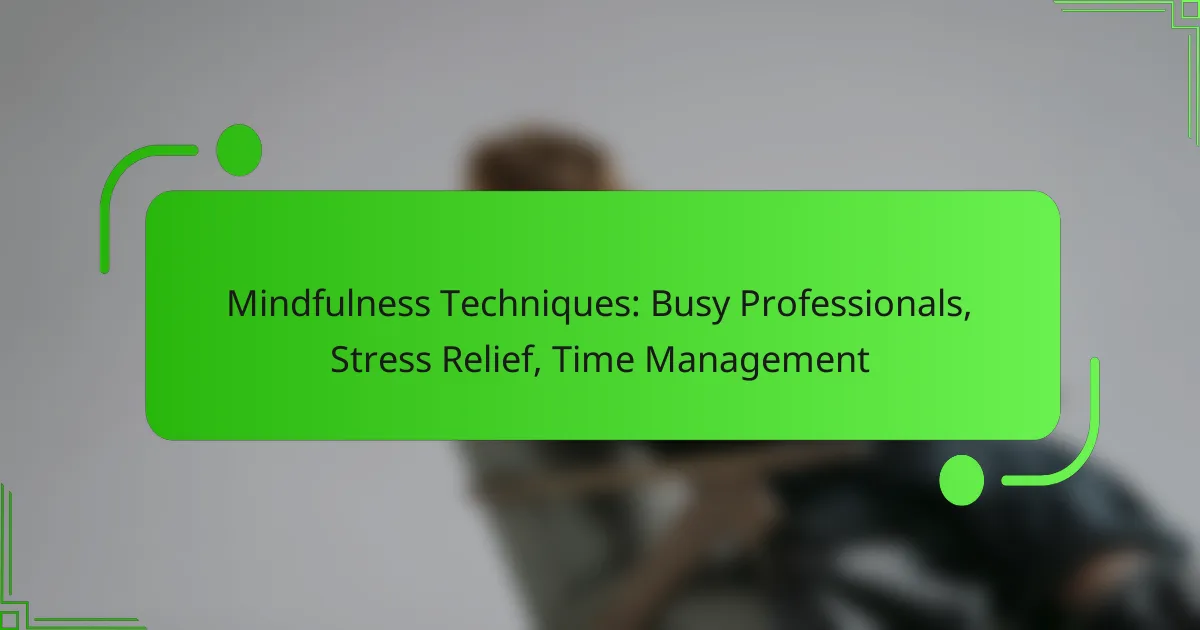Mindfulness is a powerful tool for managing chronic stress and enhancing overall well-being. By cultivating present-moment awareness and acceptance, individuals can shift their focus away from stressors, leading to improved emotional regulation and greater life satisfaction. Incorporating mindfulness into daily routines can yield long-term benefits for mental health and resilience.
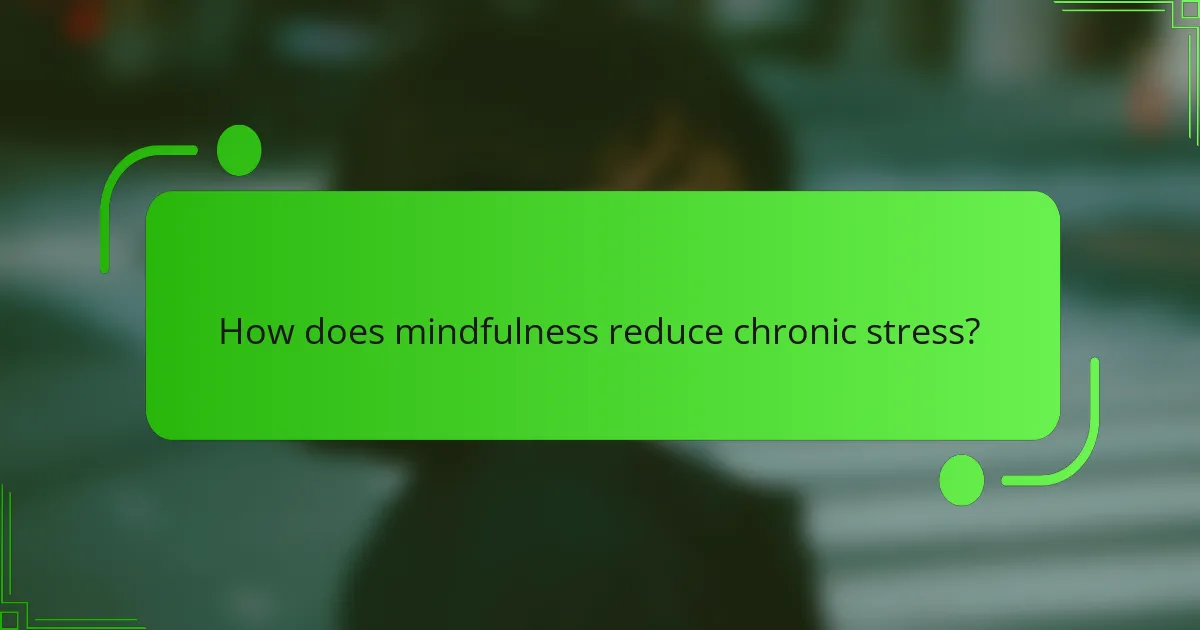
How does mindfulness reduce chronic stress?
Mindfulness reduces chronic stress by promoting awareness and acceptance of the present moment, which helps individuals manage their reactions to stressors. This practice encourages a shift in focus from stressors to a more balanced state of mind, leading to improved overall well-being.
Decreases cortisol levels
Mindfulness practices, such as meditation and deep breathing, have been shown to lower cortisol levels, the hormone primarily associated with stress. Regular engagement in mindfulness can lead to a reduction in cortisol production, which may help alleviate the physical symptoms of stress over time.
For instance, studies indicate that individuals who practice mindfulness regularly may experience cortisol reductions of around 20-30% compared to those who do not. This decrease can contribute to better health outcomes, including lower blood pressure and improved immune function.
Enhances emotional regulation
Practicing mindfulness enhances emotional regulation by helping individuals recognize and manage their emotions more effectively. This awareness allows for better responses to stressors, reducing impulsive reactions and promoting a sense of calm.
Techniques such as mindfulness meditation encourage individuals to observe their thoughts and feelings without judgment, fostering a more balanced emotional state. Over time, this can lead to improved resilience against stress and anxiety.
Improves focus and clarity
Mindfulness improves focus and clarity by training the mind to concentrate on the present moment, which reduces distractions from stressors. This enhanced focus can lead to better decision-making and increased productivity.
Practicing mindfulness for just a few minutes each day can sharpen attention and promote mental clarity. For example, simple techniques like mindful breathing or body scans can help clear mental clutter, allowing individuals to approach tasks with greater concentration and effectiveness.
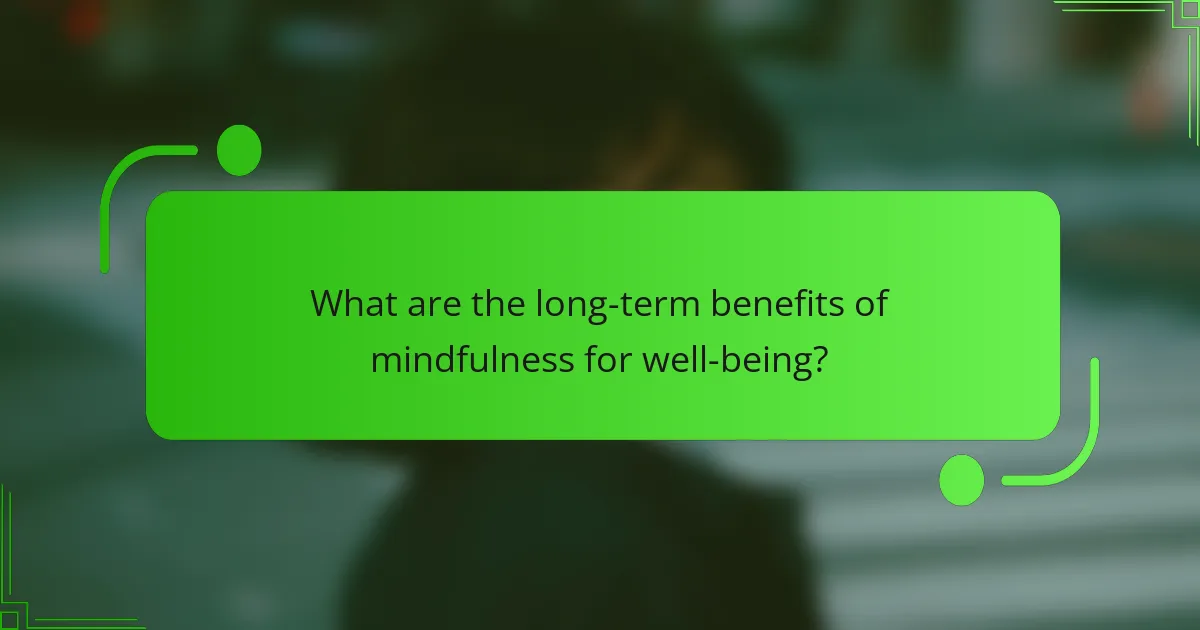
What are the long-term benefits of mindfulness for well-being?
Mindfulness offers several long-term benefits for well-being, particularly in managing chronic stress and enhancing overall mental health. By fostering a present-focused awareness, mindfulness practices can lead to improved emotional regulation and a greater sense of life satisfaction.
Increases resilience to stress
Mindfulness can significantly increase resilience to stress by promoting a non-reactive awareness of thoughts and feelings. This practice helps individuals recognize stress triggers without becoming overwhelmed, allowing for more effective coping strategies.
Regular mindfulness practice can lead to a reduction in cortisol levels, the hormone associated with stress. Techniques such as deep breathing and meditation can be incorporated into daily routines, even in short sessions of just a few minutes, to build resilience over time.
Promotes emotional stability
Practicing mindfulness enhances emotional stability by encouraging individuals to observe their emotions without judgment. This approach helps in recognizing patterns and understanding emotional responses, leading to better management of mood swings and anxiety.
Mindfulness techniques, such as body scans and mindful breathing, can be particularly effective in cultivating emotional awareness. Over time, these practices can help individuals develop a more balanced emotional state, reducing the frequency and intensity of negative emotions.
Enhances overall life satisfaction
Mindfulness contributes to enhanced overall life satisfaction by fostering a deeper appreciation for the present moment. This shift in perspective can lead to increased gratitude and a more positive outlook on life.
Engaging in mindfulness practices regularly can improve relationships and personal fulfillment. Simple activities like mindful walking or journaling can help individuals connect with their experiences, leading to a richer, more satisfying life.

How can mindfulness be integrated into daily life?
Mindfulness can be seamlessly incorporated into daily routines by practicing simple techniques that promote awareness and presence. This can involve dedicating specific times for meditation or integrating mindful moments into everyday tasks.
Mindful breathing techniques
Mindful breathing techniques focus on the breath as a way to anchor attention and reduce stress. One effective method is the 4-7-8 technique, where you inhale for four seconds, hold for seven seconds, and exhale for eight seconds. Practicing this for a few minutes daily can enhance relaxation and clarity.
Another approach is to simply observe your breath without altering it. Spend a few minutes noticing the rhythm of your inhalations and exhalations, which can help ground you in the present moment. Aim for a few sessions each week to cultivate this habit.
Daily meditation practices
Incorporating daily meditation practices can significantly enhance mindfulness. Start with just five to ten minutes each day, focusing on your breath or a specific mantra. Gradually increase the duration as you become more comfortable with the practice.
Consider using guided meditations available through various apps or online platforms. These resources can help structure your sessions and provide a range of techniques, from body scans to loving-kindness meditation, catering to different preferences and needs.
Mindfulness in everyday activities
Mindfulness can be practiced during everyday activities, such as eating, walking, or even washing dishes. Focus on the sensations, smells, and textures involved in these tasks to cultivate awareness. For example, when eating, take time to savor each bite and notice the flavors and textures.
To integrate mindfulness into walking, pay attention to the movement of your legs and the feeling of the ground beneath your feet. This can transform routine activities into opportunities for mindfulness, enhancing overall well-being and reducing chronic stress.

What are the prerequisites for effective mindfulness practice?
Effective mindfulness practice requires a commitment to regular engagement and a solid understanding of mindfulness principles. These prerequisites help individuals cultivate the necessary mindset and skills to manage chronic stress and enhance overall well-being.
Commitment to regular practice
Regular practice is essential for developing mindfulness skills. Aim for at least a few minutes each day, gradually increasing the duration as you become more comfortable. Consistency is key; even short, daily sessions can lead to significant benefits over time.
To maintain commitment, consider setting specific times for your practice, such as early mornings or before bed. Use reminders or mindfulness apps to help you stay on track. Remember, the goal is to integrate mindfulness into your daily routine, making it a habit rather than a chore.
Understanding mindfulness principles
A clear understanding of mindfulness principles is crucial for effective practice. Mindfulness involves paying attention to the present moment without judgment, allowing you to observe thoughts and feelings without becoming overwhelmed by them. This awareness can help in managing chronic stress and improving emotional regulation.
Familiarize yourself with key concepts such as acceptance, non-reactivity, and self-compassion. Reading books or attending workshops can deepen your understanding. Engaging with a community or finding a mentor can also provide support and enhance your mindfulness journey.
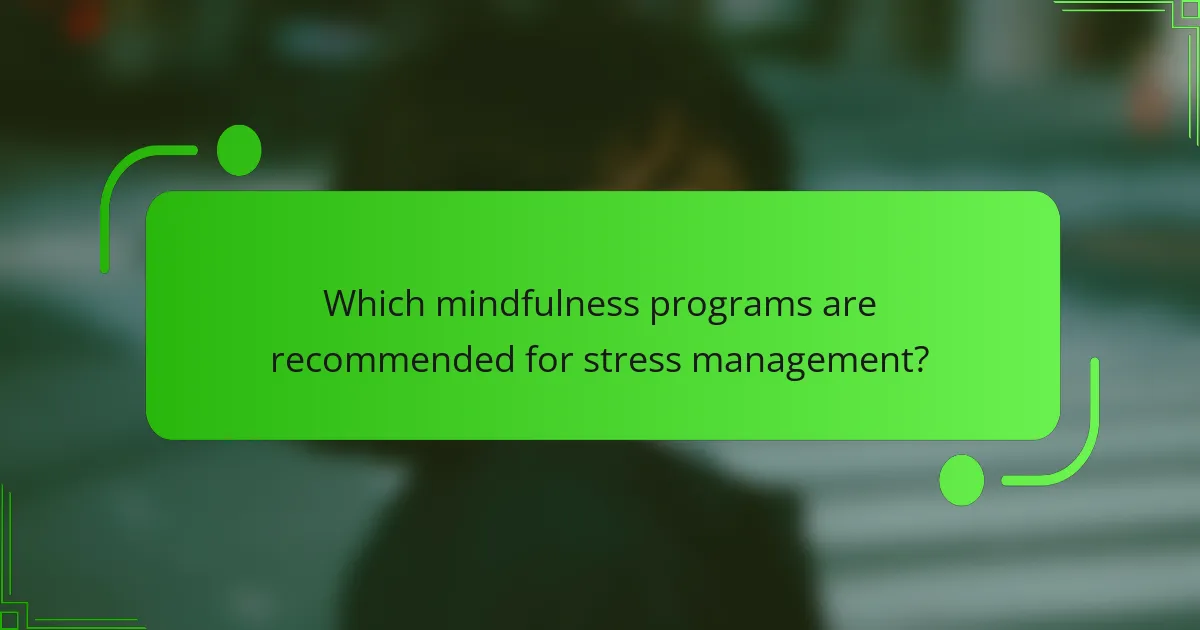
Which mindfulness programs are recommended for stress management?
Several mindfulness programs are effective for managing stress, with Mindfulness-Based Stress Reduction (MBSR) and Mindful Self-Compassion (MSC) being among the most recommended. These programs focus on cultivating awareness and self-compassion to reduce stress and enhance overall well-being.
Mindfulness-Based Stress Reduction (MBSR)
Mindfulness-Based Stress Reduction (MBSR) is an evidence-based program developed by Dr. Jon Kabat-Zinn that combines mindfulness meditation and yoga. It typically spans eight weeks and includes weekly group sessions, daily home practice, and guided meditations.
MBSR helps participants develop greater awareness of their thoughts and feelings, allowing them to respond to stress more effectively. Common practices include body scans, mindful breathing, and gentle yoga, which can be easily adapted to individual needs.
To get started with MBSR, look for local classes or online programs. Many health insurance plans may cover these programs, so check with your provider for options.
Mindful Self-Compassion (MSC)
Mindful Self-Compassion (MSC) is a program designed to teach individuals how to be kinder to themselves during difficult times. Developed by Dr. Kristin Neff and Dr. Christopher Germer, MSC typically consists of an eight-week course that includes guided meditations, exercises, and group discussions.
This program emphasizes the importance of self-kindness, common humanity, and mindfulness in reducing stress and enhancing emotional resilience. Participants learn to recognize their suffering and respond with compassion rather than criticism, which can significantly improve mental well-being.
To engage with MSC, consider joining a local workshop or accessing online resources. Many participants find that integrating self-compassion practices into their daily routines helps maintain long-term stress management benefits.

How does mindfulness affect physical health?
Mindfulness can significantly enhance physical health by reducing stress and promoting overall well-being. By fostering a state of awareness and acceptance, mindfulness practices can lead to better management of chronic conditions and improved physiological responses.
Reduces symptoms of chronic pain
Mindfulness has been shown to alleviate chronic pain by altering the perception of pain and reducing emotional responses to it. Techniques such as meditation and focused breathing can help individuals manage pain more effectively, often leading to a decrease in reliance on pain medications.
Practicing mindfulness may involve engaging in regular sessions of meditation or yoga, which can enhance pain tolerance and improve coping strategies. Many individuals report a reduction in pain levels by focusing on the present moment rather than fixating on discomfort.
Improves sleep quality
Mindfulness practices can lead to better sleep quality by calming the mind and reducing anxiety, which are common barriers to restful sleep. Engaging in mindfulness before bedtime can help individuals unwind and prepare for sleep, often resulting in longer and more restorative sleep cycles.
Incorporating mindfulness techniques such as deep breathing or guided meditation into a nightly routine can be beneficial. Studies suggest that even short sessions of mindfulness can improve sleep duration and reduce insomnia symptoms, making it a valuable tool for those struggling with sleep issues.

What are common misconceptions about mindfulness?
Many people mistakenly believe that mindfulness is solely about meditation. While meditation is a popular practice within mindfulness, it encompasses a broader range of techniques aimed at enhancing awareness and presence in daily life.
Mindfulness is not just meditation
Mindfulness includes various practices beyond traditional meditation, such as mindful breathing, body scans, and mindful walking. These techniques can be integrated into everyday activities, allowing individuals to cultivate awareness in moments like eating, walking, or even during conversations.
For instance, practicing mindful eating involves paying full attention to the taste, texture, and aroma of food, which can enhance the overall experience and promote healthier eating habits. This approach can help reduce stress and improve well-being by encouraging individuals to slow down and appreciate the present moment.
Additionally, mindfulness can be practiced informally throughout the day. Simple techniques like taking a few deep breaths before responding to an email or focusing on your surroundings while commuting can significantly reduce stress and enhance mental clarity.
